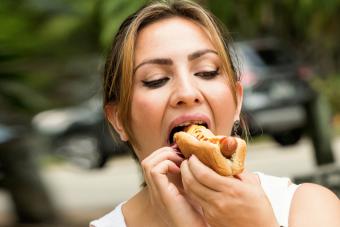
You may be wondering what the best pregnancy diet is. Pregnancy is one of the few times in most women's lives when they do not need to be concerned with cutting calories. However, this does not mean pregnant women do not need to watch what they eat; merely the emphasis shifts from watching calories to ensuring they eat enough of the proper nutrients needed to provide for their unborn babies.
The Balanced Pregnancy Diet
To ensure your unborn baby gets adequate nutrients, do not rely strictly on prenatal vitamins that are high in folic acid and iron. Make sure you eat healthy, well-balanced meals. Each day, you will want your pregnancy diet to include:
- 6 to 11 servings of grain products
- 6 to 8 glasses of fluids, which includes water, juice, tea, etc.
- 4 to 6 servings of milk and milk products
- 3 to 5 servings of vegetables
- 3 to 4 servings of meat and proteins
- 2 to 4 servings of fruits
Foods to Avoid
While eating healthily is the primary goal when pregnant, there are certain foods you may want to avoid in your pregnancy diet:
- Food additives such as monosodium glutamate (MSG), which is used to enhance the flavor of bouillon and many Asian foods, can cause an upset stomach and headaches.
- Unpasteurized foods may contain bacteria that can harm your baby. Unpasteurized products may include: fresh juices; certain milk products including smoothies and yogurt; and soft cheeses, such as brie, feta, and some mozzarellas.
- While most fish is a healthy addition to your diet, avoid shellfish, swordfish, tilefish, shark, king mackerel, grouper, mahi mahi, and amberjack. Also avoid raw sushi and sashimi and limit self-caught freshwater fish to less than six ounces per week while you are pregnant. They may contain contaminants that are harmful to the development of your growing fetus.
- Herbal teas may sound harmless, but many can be detrimental to your pregnancy. Avoid teas that include slippery elm, ginseng, cohash and other herbs that may stimulate contractions.
- Alcoholic beverages and foods. Alcohol prevents the absorption of essential nutrients such as folic acid and iron. It can also lead to long-term developmental issues with your unborn child.
If you are unsure whether a food is safe for consumption during your pregnancy, read the nutritional information and ingredients list on the label, or if eating out, ask questions.
Foods to Limit
A healthy pregnancy diet is based on balance and eating foods high in nutrients and low in fat, sugar, and caffeine. As little as 3 to 4 cups of coffee or caffeinated tea can be harmful to your pregnancy and fetus. To learn more about the effects of caffeine and products that contain caffeine, review our article on Caffeine and Pregnancy.
While dieting to watch your weight is not recommended with a pregnancy diet, limiting your fat and cholesterol intake is still advisable. A developing fetus needs some fat and cholesterol, but only 20% of your pregnancy diet should include fats.
Eating Around Food Aversions
During the first few weeks of pregnancy, it may seem like everything makes you nauseous. You may find it hard to sit down to healthy meal or to eat more than a few bites at a time. If this is the case, keep healthy snacks with you and eat several small meals a day. It may also help to avoid foods with strong flavors and odors.
In Conclusion
A pregnancy diet is not about restricting calories. It is about taking care of yourself and providing your growing baby with all the nutrients needed for healthy development.







